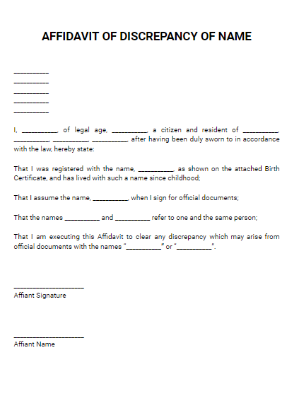- Eviction Notice Forms
- Power of Attorney Forms Forms
- Bill of Sale (Purchase Agreement) Forms
- Lease Agreement Forms
- Rental Application Forms
- Living Will Forms Forms
- Recommendation Letters Forms
- Resignation Letters Forms
- Release of Liability Agreement Forms
- Promissory Note Forms
- LLC Operating Agreement Forms
- Deed of Sale Forms
- Consent Form Forms
- Support Affidavit Forms
- Paternity Affidavit Forms
- Marital Affidavit Forms
- Financial Affidavit Forms
- Residential Affidavit Forms
- Affidavit of Identity Forms
- Affidavit of Title Forms
- Employment Affidavit Forms
- Affidavit of Loss Forms
- Gift Affidavit Forms
- Small Estate Affidavit Forms
- Service Affidavit Forms
- Heirship Affidavit Forms
- Survivorship Affidavit Forms
- Desistance Affidavit Forms
- Discrepancy Affidavit Forms
- Guardianship Affidavit Forms
- Undertaking Affidavit Forms
- General Affidavit Forms
- Affidavit of Death Forms
Discrepancy Affidavit
Have you ever wondered how people with lengthy birth names get by with their day to day? Imagine how much effort it takes to fill up a form with a name no one could ever remember on their first try. It’s one of the reasons why many individuals have become accustomed to using nicknames for anything and everything. While it may seem convenient in most scenarios, this practice can also cause problems when it comes to proving your identity. This is where a Discrepancy Affidavit comes in handy. Read More

What Is a Discrepancy Affidavit?
A Discrepancy Affidavit contains a sworn statement attesting to the truthfulness of a fact with the intention to explain and clear a discrepancy in a document(s). While clerical errors are often to blame for this occurrence, many individuals admit to intentionally making the change due to little regard for what it may entail from a legal standpoint. A simple mistake from the lack of knowledge regarding certain information, such as the exact address of a residence due to inconsistencies in public records, is another factor to consider. So if you don’t have the time to correct this information and go through the daunting process of making this change with the appropriate agencies, an affidavit of discrepancy can help address this problem for the time being.
How Do I Create a Discrepancy Affidavit?
If you have a deadline to catch and need a Discrepancy Affidavit as soon as possible, you’ll be glad to know that affidavits are easy to make even without the help of a lawyer. But to ensure its validity, you need to have all your bases covered. The following tips will help you draft a Discrepancy Affidavit that contains all the essentials of an admissible legal document:
Gather the Necessary Information
As the affiant, or writer of the affidavit, you must state your full legal name, age, civil status, citizenship, and place of residence. Make sure to have a valid document to support this information. Documents such as a birth certificate, passport, driver’s license, baptismal certificate, school record, and billing statement may serve as proof that the affiant details appearing on the affidavit are true and correct.
Provide an Explanation for the Discrepancy
The circumstances surrounding the discrepancy is something you’ll need to narrate in the affidavit. Anyone can find themselves in this situation for reasons that are sometimes out of their control or even out of the ordinary. Regardless of whether it’s a case of the office clerk misspelling your name by mistake, or you knowingly leaving your second name out of important documents, providing an explanation for the inconsistencies between data is a vital part of your affidavit. Also, remember to point out the discrepancy clearly for the reader to know where to look.
Be Truthful
Lying in any legal document is never a good idea. In an affidavit, you’re making a sworn statement to attest to certain information that is true and accurate according to your knowledge. Thus, perjury is a serious offense that the law does not take lightly. Not only will you be barred from making the correction, but you could also face legal and financial consequences for your actions. While lapses in the system may somehow allow you to get away with it, there’s no telling what the penalties could be if caught now or later.
Sign and Notarize the Affidavit
The closing section of the document must contain a jurat, or a statement of affirmation, to dictate that you have executed the affidavit in the presence of a notary or authorized official. Notarized affidavits are generally a must; however, some state laws do not require it for certain types of affidavits. Keep in mind that the notary public will only certify the affidavit if you are able to present sufficient proof of identity. For that reason, be sure to prepare any form of valid identification cards or certificates as evidence.
FAQs
Are affidavits legally binding?
An affidavit is made voluntarily while under oath. Once you sign the document, it means you attest to the truthfulness of its content. Doing so legally binds you to the affidavit and subjects you to being charged for perjury if the information reflected in the affidavit turns out to be false. Although there are considerations to such cases, it’s important to be aware that fraudulent documents are still unacceptable under state and federal law.
How do I know that an affidavit is valid?
We need to consider what counts as a valid affidavit. For starters, the affidavit must contain the correct information, then it must be signed and notarized accordingly. You need to make sure that the information provided in the document is accurate and consistent with your supporting documents before having it reviewed by a notary public.
What makes a notarized affidavit invalid?
Even notarized affidavits get rejected, but it’s not entirely the fault of the affiant. Simple errors that you and the notary might have missed include incorrect names, illegible notary seals, stamping over texts, and the use of correction fluids to change incorrect information. As the affiant who will benefit from the affidavit, pay attention to the little details and make sure to visit a certified notary public or signing agent to avoid problems.
Does an affidavit expire?
Contrary to many legal documents, an affidavit is valid for its contents indefinitely. Since an affidavit does not have a validity period that you need to be aware of, you don’t have to worry about it expiring for no particular reason. However, it is also possible that your personal information has since been updated due to several circumstances, such as a change of residential address or a change of surname after marriage. In such cases, the affidavit may no longer be accepted.
While you may not need one now, there are many scenarios that may require you to obtain a Discrepancy Affidavit for an important purpose. It’s one of the most common documents used to deal with personal and business affairs. With the guidelines above, you should have a better understanding of their usage and creation in case you might need one. Don’t hesitate to seek advice from a legal expert for concerns relevant to your situation.
